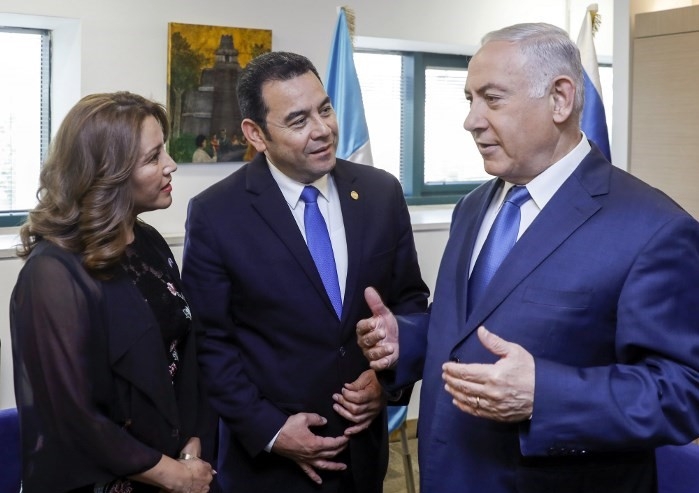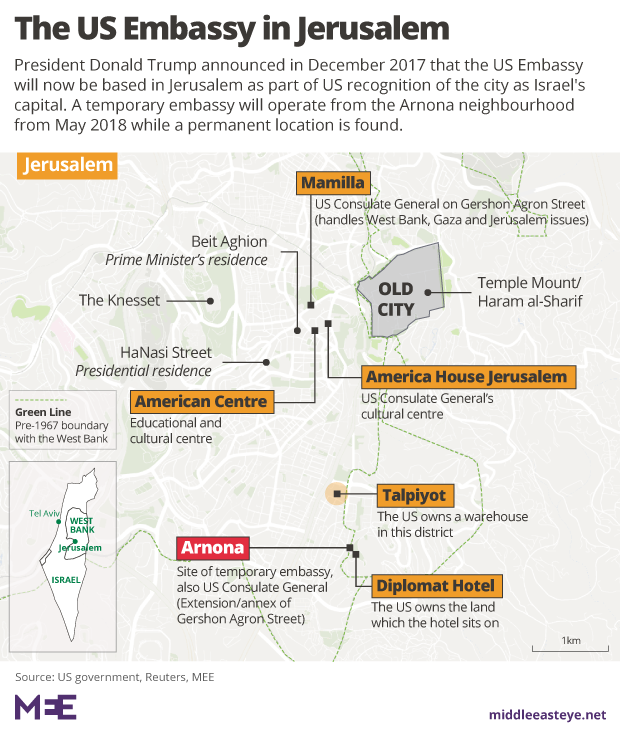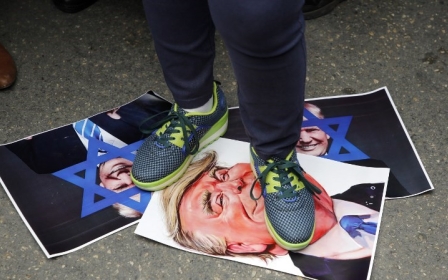The truth behind Central America's rush to follow US embassy move

While people in Gaza - and around the world - were still mourning the 62 Palestinians killed, over 2,700 maimed and injured in just one day as a result of yet another Israeli massacre of unarmed civilians, a second embassy was holding its opening ceremony in Jerusalem on 16 May.
Guatemala has followed in the shadow of the US move.
Israel had to promise to pay for the expenses of the relocation. The Israeli Foreign Ministry footed part of the cost of transferring the Guatemalan embassy from Rishon LeZion to Jerusalem, contributing a total of $300,000.
Israel's relations with Honduras and Guatemala grew particularly strong during the dark days of the Central American dictatorships, when Israel offered lavish military support to the Guatemalan generals during the period of the genocide of the Mayas in the early 1980s
Jimmy Morales, the country's right-wing president, who was asked by civil society groups last month to resign over corruption allegations, had to ask the courts for permission for his brother and son, both under trial for corruption, to accompany him to Jerusalem. Nevertheless Guatemalan media has already discovered dodgy expense sheets for the embassy opening ceremony in the accounts of their government.
Still, this falls short of the grotesque display offered by the US opening ceremony. While Israel mowed down protesters, armed only with their determination to return to their homes rather than to succumb silently in the brutal siege of Gaza, Donald Trump announced via video link that "we are actually making great headway" in a deal between Israel and the Palestinians.
A tragic, inhuman reality
One would call it surreal if the White House recognition of Jerusalem as Israel's capital - which according to international law is not part of Israel - and the subsequent relocation of the US embassy were not part of a tragic, inhuman reality imposed upon the Palestinian people.
Seventy years after the start of the Nakba - the mass ethnic cleansing of the Palestinian people - Israeli policies of displacement, land and resource theft, repression and segregation continue day after day. The Great Return March in Gaza, which calls for a UN-sanctioned right of return for the refugees that make up over half of the Palestinian people, has been turned into carnage.
The US embassy move is not only a frontal attack on Palestinian rights in Jerusalem, it has also given Israel diplomatic cover for yet another massacre in Gaza
The US embassy move is not only a frontal attack on Palestinian rights in Jerusalem, it has also given Israel diplomatic cover for yet another massacre on Gaza. It sends the message that Israel's regime can continue with all violations of international law and most basic human rights.
This includes the physical attack not only on their right of return but the very lives and existence of the Palestinian refugees in Gaza. This may induce the impression that Israel is at the peak of its power, with impunity guaranteed.
In December, the US and Israel were deeply isolated in the UN General Assembly vote on the US recognition of Jerusalem as Israel's capital. Only five other countries voted along with the US-Israel axis.
Political stupidity
Legitimising the US recognition of Jerusalem as Israel’s capital - a city over which Israel under international law does not have sovereignty - is a precedent that threatens the very foundations of international relations. If the US can arbitrarily decide matters of territorial sovereignty, the interests of far too many countries will be threatened.
Crucial checks against the whims and will of US power will be shattered. Accepting this would mean complete dependence on the US or complete political stupidity. Nevertheless, at the time, Israel predicted that up to 10 countries might relocate their embassies. Today, only Guatemala's embassy move is underway.
Commentators across the concerned Latin American countries have openly admitted that positions around Jerusalem were more than anything a question of securing US favours, including in order to keep their power against their own population
Israel hopes that Honduras may be the next to relocate its embassy.
What is it about Israel's relationship with these central American states that sees them join in a dangerous move rejected by the vast majority of the international community?
Israel's relations with Honduras and Guatemala grew particularly strong during the dark days of the Central American dictatorships, when Israel offered lavish military support to the Guatemalan generals during the period of the genocide of the Mayas in the early 1980s. It trained Honduran special forces accused of torture and used the country as a base to support the Contras in Nicaragua.
Today, Honduras is in the midst of a cycle of vicious human rights violations by the government of Juan Orlando Hernandez, who came to power in a "parliamentary coup". So tainted by blood is this government that Hernandez' presence at Israel's "Independence Day" had to be cancelled after protests from the Israeli side were raised.
A litmus test
The Paraguayan president, who has also indicated his intention to shift his embassy, has similarly come to power in a "parliamentary coup". Considering that he will leave office in August, it seems doubtful whether the relocation will actually happen.
The attempt by Romania's prime minister to start a process of relocation has been thwarted by the president of the country calling for her resignation over her step.
The opening ceremony of the US embassy itself was a litmus test without the possibility of abstention - either the invitees would show up or boycott. Even close allies of the US such as Australia, Canada and Western European states decided to stay away. Similarly, neither did India nor any of Latin America's major countries participate.
However Israel is making major inroads in Africa, and nearly a dozen African states attended the US embassy move in Jerusalem/. They included Ethiopia, South Sudan, Zambia, Kenya, Rwanda, Cameroon, Republic of the Congo, Angola, Ivory Coast, Tanzania and the Democratic Republic of the Congo.
Togo was the only African country that voted with the US during the UN vote in December - but was absent on Monday.
Most of the reasons why countries have chosen to show up have little to do with Palestine. As commentators from the concerned Latin American countries have openly admitted, positions around Jerusalem were more than anything a question of securing US favours, including assistiance in maintaining power against their own populations.
For others it was a logical extension of xenophobic, right-wing, supremacist, authoritarian politics. Austria's government is largely shunned in Europe for its racist and xenophobic policies, while Victor Orban, the prime minister of Hungary, is a known xenophobic anti-Semite. The president of the Czech republic, Milos Zeman, is known for his fear-mongering and racist rhetoric.
The delegation from Myanmar, which with Israel's military support has since 2015 engaged in large-scale ethnic cleansing of the Rohingya people, driving almost 700,000 survivors into exile, was also among the guests.The fact that Robert Jeffress, the US evangelical pastor and faith advisor of Trump, widely accused of anti-Semitic and racist preaching, addressed this congregation, seems only natural.
The Trump-Israel alliance, on the backdrop of the massacre in Gaza, has effectively elevated support for Israeli apartheid, occupation and colonialism as the fulcrum of a new tide of xenophobic, racist, anti-democratic politicians and political parties that have come to power in recent years.
A military embargo on Israel
As Israel names a central square in Jerusalem in honour of Donald Trump, all those outside the camp of supremacist, racist and authoritarian ideologies should shudder at the idea of being associated with this.
For the sake of Palestine and of humanity, it is the moment to shake off the unwillingness to take effective action by the large majority of the international community that does not adhere to the values expressed in the US embassy ceremony.
Standing up to Israeli violations of human rights and international law today has turned into a vital defence of the most basic values of tolerance, democracy and respect. There is still time.
Israel has just announced record exports for 2017 of the weapons that it has been testing for decades on the Palestinian people. A military embargo on Israel, as called for by the Palestinian BDS national committee and echoed by human rights organisations such as Amnesty International, would be a step in the right direction.
Much of these exports are related to anti-migration policies and related border security spending of the European Union, while India alone is buying 50 percent of Israel's weapons exports.
US military aid continues to increase and US police cooperation with Israel fuels racial discrimination and human rights violations there.
These are times to remember the slogan popularised by the Spanish anti-fascist resistance in the 1930s and then taken up by innumerable global justice movements: No Pasarán! They shall not pass!
- Maren Mantovani, coordinator of international relations of the Palestinian Grassroots Anti-Apartheid Wall Campaign, www.stopthewall.org
The views expressed in this article belong to the author and do not necessarily reflect the editorial policy of Middle East Eye.
Photo: Guatemalan President Jimmy Morales (C) and his wife Hilda Patricia Marroquin (L) speak with Israeli Prime Minister Benjamin Netanyahu (R) ahead of the inauguration ceremony of Guatemala's embassy in Jerusalem on 16 May, 2018 (AFP)
Stay informed with MEE's newsletters
Sign up to get the latest alerts, insights and analysis, starting with Turkey Unpacked
Middle East Eye delivers independent and unrivalled coverage and analysis of the Middle East, North Africa and beyond. To learn more about republishing this content and the associated fees, please fill out this form. More about MEE can be found here.







